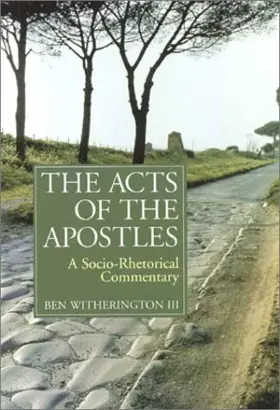

The Acts of the Apostles: A Socio-Rhetorical Commentary
in Socio-Rhetorical Commentary
Pages
874
Publisher
Eerdmans
Published
1/1/1997
ISBN-13
9780802845016
Collections
This book appears in the following featured collections.
- Favorite Advanced NT Commentaries by Jeremy Pierce (parableman)
- Recommended NT Commentaries by Denver Seminary Journal
- D. A. Carson's Commentary "Best Buys" by D. A. Carson
- Ultimate Commentary Collection: NT Technical by John Glynn
- New Testament Advanced Commentaries by Moore Theological College Journal: Societas
- The Pastor’s Bookshelf by Scot McKnight
Reviews
This commentary is one of the best for cultural background material for reading Acts and has been the “first off the shelf” for me for several years. Witherington provides some exegetical commentary, although the general reader will have no problem reading the commentary since this is not the main thrust of the book. Where the commentary excels is the massive amount of Greco-Roman material which is brought to bear on the text of Acts. As with all the Socio-Rhetorical commentaries, Witherington uses lengthy excursuses in a slightly smaller font to develop special themes. These “closer looks” are worth the price of the book alone! For example, after introducing Aquila and Priscilla in Acts 18, he provides five pages on Judaism as a religio licita. This detailed section is worthy of a major Bible Dictionary article. One of the criticisms I have of other volumes in this series is the somewhat forced use of Greco-Roman rhetorical forms, but this is not a problem here in Acts.
This volume has taken over from Bruce as my first choice on Acts. While it isn't by any means exhaustive, and it is specific in its intent, it does still provide important exegetical insights as well as the focused examination of social/historical context and rhetorical style. Definitely a great resource.
There is near-unanimous praise for Ben Witherington’s socio-rhetorical approach and its suitability to the book of Acts. Carson explains the phrase, saying that it “tends to mean no more than that the author is sensitive both to the world of the first century and to the structure of the text.”
[Full Review]
Definitely one of Ben's best contributions!
This is just great. So interesting. Doesn't try cover everthing, but the stuff discussed is thought provoking and helpful. Up there with Fitzmyer and Calvin.
Then I go to Ben Witherington
[Full Review]
This is Witherington at his best. He doesn't force his "socio-rhetorical" method onto Acts, weeds through some of the difficulties well and leaves the reader understanding the passage better than when they started. It's worth getting the book just for the introduction. His argument for the early date of Galatians is persuasive, and Witherington sees Acts as a reliable guide for events in the earliest years of the church. For instance, his discussion on Paul's conversion, comparing Acts and Paul's autobiographical accounts in his letters, carefully balances considerations of genre, authorial intent and audience. Altogether a terrific commentary, one I'd highly recommend.
Ben Witherington's series of "socio-rhetorical" commentaries vary in terms of their helpfulness. At over 900 pages, this is one of the largest in the series, and one of the most useful. There is a large amount of information in this commentary that is not found in others, and the extensive bibliography is a plus as well.
[Full Review]
Grand Rapids: Eerdmans/Carlisle, UK: Paternoster, 1998. Pp. xlviii + 875, Paperback, $50.00, ISBN 0802845010. Richard I. Pervo Seabury-Western Theological Seminary Evanston, IL 60201 From the active pen of Ben Witherington comes another substantial book, clearly intended to complement his studies of Pauline correspondence, a felicitous project for one who views Acts and the letters themselves as fully complementary. In short, Witherington represents a classical conservative school of thought. Whoever wishes to find mere paraphrase of Ramsay or Bruce will, however, be disappointed. Witherington is independent, and his agendas extend beyond conventional apologetics. The subtitle promises two emphases, of which rhetoric is the more fruitful and innovative. Witherington utilizes ancient rhetoric for both the analysis of the various speeches and for reflection upon narrative exposition, opening the door to literary analysis. A noteworthy feature of the speeches is the frequency and quantity of narratio, although one would expect missionary sermons to be deliberative. This phenomenon signals two qualities highlighted by Witherington: the integration of speech into the narrative and the author's goal of legitimating the Christian movement in its Gentile manifestation. Speeches carry, expound, and expand the story rather than just comment on events. The social dimension of this commentary is mostly of the descriptive sort, with limited attention to social-scientific methods. The distance such methods can provide might have helped Witherington avoid what M. I.
[Full Review]












